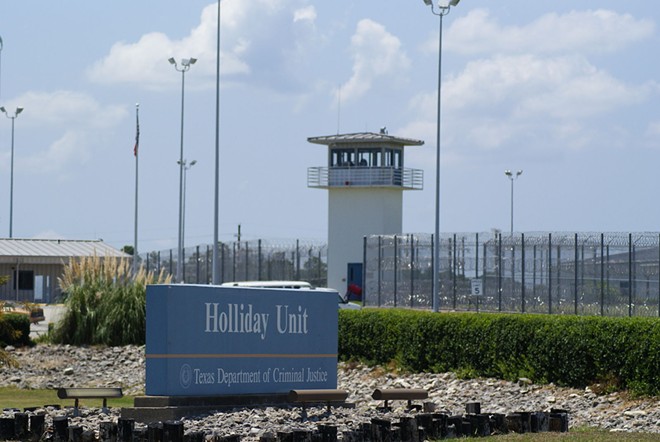Editor's Note: Bad Takes is a column of opinion and analysis.
If you think one of the few upsides of ending up in prison is that you'd be able to catch up on all the reading you failed to find time for while on the outside, think again.
The Marshall Project, a bastion of criminal justice journalism, asked every state prison system for a list of books inmates were prohibited from reading. While just 18 states replied, the resultant list, published last month as a database, comprises 54,000 titles. More than 9,000 of those are banned in Texas' prisons alone.
The Lone Star State already leads the nation in books yanked off the shelves of school libraries, according to a recent PEN America analysis. But telling someone on death row they'll never be allowed to read Alex Haley's Roots represents a new low in petty infantilization. Add to that classic The Color Purple, The Prince of Tides, the prison letters of activist George Jackson, three collections of short stories and poems by Charles Bukowski, one by David Foster Wallace, five novels by Joyce Carol Oates, five by Irvine Welsh, three by John Grisham, two by Mario Puzo, a Gore Vidal, a Ray Bradbury, and even — I shit you not — the Stephen King novella that inspired the Oscar-nominated film The Shawshank Redemption.
Not only can't Texas convicts read about prison breaks, they also can't learn to code C++ because of "security concerns," can't consult road atlases or almanacs since that could "facilitate an escape" and can't read about boxing legend Jack Dempsey because they might get pugnacious.
According to Texas officials, The Wit And Wisdom of Archie Bunker is off limits because it includes "racially charged language" (duh), Poker Plays You Can Use "advocates gambling" (double duh) and Clive Barker's The Great And Secret Show evidently features an act of bestiality, if you needed another reason to not read Clive Barker.
Comedian Richard Pryor's autobiography, fittingly titled Pryor Convictions, which recounts his tumultuous childhood growing up in a brothel and efforts to overcome drug addiction, is off-limits too — despite how invaluable those life experiences might prove for those struggling to put their own lives back together.
Texas also prevents prisoners from accessing "sexually explicit" comics by Robert Crumb, Alan Moore and Frank Miller along with graphic art by H.R. Giger or Alejandro Jodorowsky. It also bans a graphic novel about working-class hero Joe Hill — because goodness help us if those with a lot of time on their hands took up drawing. Or labor activism.
And, for the philosophically inclined, there's no Introducing Nietzsche or Introducing Foucault, lest the "docile bodies" ensnared in the panopticon think too hard.
I even had to inform my own mother that she must avoid committing felonies since two of Danielle Steel's romances made the list.
Outlawing any depiction of drug use, nudity or violence could effectively censor the bulk of Western literature. No books about dream interpretations are permitted, for example, since those may be sexual in nature. Even books that glamorize the rock 'n' roll lifestyle, from biographies of Jimi Hendrix to Tom Petty to a FAQ book about The Rocky Horror Picture Show are verboten to Texas prisoners.
One wonders who the state-sanctioned smut hunters were that got paid to read through all these books.
Less funny is the fact that the sole justification provided for many of the bans is their portrayals of rape, which applies even to Susan Brownmiller's Against Our Will, a stridently feminist critique of rape culture.
Rose Luna, head of the Texas Association Against Sexual Assault, relayed in an op-ed for the Austin American-Statesman, that five of the nation's 10 most sexually violent prisons in the country are in this state. Newsweek magazine, not generally known as a fringe or outlandish publication, credibly called Texas the "prison rape capital of the world."
Just don't try reading one of the most impactful books of the 20th century about rape. Because that's contraband.
Of course, not being free to peruse Mysteries of the Mexican Pyramids is the least of most prisoners' troubles. Though they can't partake of the works of the Marquis de Sade, they endure sadism on a regular basis. As Bolts magazine Managing Editor Michael Barajas, a former San Antonio Current editor, reported last summer, thanks to a gaping loophole in the 13th Amendment against slavery, "Texas is one of seven states, all in the South, that force people in prison to work but pay them nothing for almost all jobs."
"The agricultural industries in Texas prisons sometimes even lose money," Barajas later told the Texas Standard. "I think sometimes the cruelty of the labor is the point."
So, slave labor is still legal in Texas. But for one of those laborers, after an exhausting unpaid workday, to read an accurate portrait of slavery such as Alex Haley's Roots violates the rules.
Although it's tempting to dismiss the absurdity of Texas prisons' book bans, as "out of sight, out of mind," remember that 95% of state prisoners ultimately return to society, perhaps to a community near you.
Wouldn't you rather they at least had the chance to become well-read — and perhaps a better person — while serving their sentence?
Follow us: Google News | NewsBreak | Instagram | Facebook | Twitter


